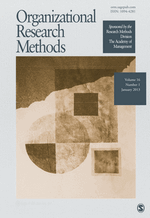Dealing With Outliers in Organizational Science Research
Editor’s note: We are pleased to welcome Herman Aguinis, Ryan K. Gottfredson, and Harry Joo, all of Indiana University, whose article “Best-practice Recommendations for Defining, Identifying, and Handling Outliers” is forthcoming in Organizational Research Methods and now available in the journal’s OnlineFirst section.
Our article was motivated by the need to address the following key questions faced by virtually every researcher conducting empirical work: Do I have outliers in my data? How do I know whether I do? Are they affecting my results? How do I deal with them? Malcom Galdwell, in his bestselling book “Outliers,” went so far as to state that a greater understanding of outliers can help us “build a better  world…that provides opportunities for all” (p. 268). However, our literature review based on 46 methodological sources and 232 organizational science journal articles addressing outliers revealed that researcher usually view outliers as “data problems” that must be “fixed.” Also, our review uncovered inconsistencies in recommendations regarding outliers across various methodological sources, as well as the use of a variety of faulty practices by substantive researchers.
world…that provides opportunities for all” (p. 268). However, our literature review based on 46 methodological sources and 232 organizational science journal articles addressing outliers revealed that researcher usually view outliers as “data problems” that must be “fixed.” Also, our review uncovered inconsistencies in recommendations regarding outliers across various methodological sources, as well as the use of a variety of faulty practices by substantive researchers.
 Our goal was to produce a manuscript that describes best-practice recommendations on how to define, identify, and handle outliers. Our article offers specific recommendations that researchers can follow in a sequential manner to deal with outliers. We believe that our guidelines will not only be helpful for researchers, but also serve as a useful tool for journal editors and reviewers in the evaluation of manuscripts. For example, much like editors and reviewers should demand that authors be clear and specific about a study’s limitations, we suggest that they should also request that authors include a few sentences in every empirically-based manuscript describing how error, interesting, and influential outliers were defined, identified, and handled. Moreover, guidelines for publication such as those produced by the Academy of Management and American Psychological Association should force authors to include a short section on “Outlier Detection and Management” within the results section. In other words, this description should include how each of the three types of outliers has been addressed in all empirical studies. Our decision-making charts can serve as a checklist in this regard. Overall, we hope that our guidelines will result in more consistent and transparent practices regarding the treatment of outliers in organizational and social science research.
Our goal was to produce a manuscript that describes best-practice recommendations on how to define, identify, and handle outliers. Our article offers specific recommendations that researchers can follow in a sequential manner to deal with outliers. We believe that our guidelines will not only be helpful for researchers, but also serve as a useful tool for journal editors and reviewers in the evaluation of manuscripts. For example, much like editors and reviewers should demand that authors be clear and specific about a study’s limitations, we suggest that they should also request that authors include a few sentences in every empirically-based manuscript describing how error, interesting, and influential outliers were defined, identified, and handled. Moreover, guidelines for publication such as those produced by the Academy of Management and American Psychological Association should force authors to include a short section on “Outlier Detection and Management” within the results section. In other words, this description should include how each of the three types of outliers has been addressed in all empirical studies. Our decision-making charts can serve as a checklist in this regard. Overall, we hope that our guidelines will result in more consistent and transparent practices regarding the treatment of outliers in organizational and social science research.
Read “Best-practice Recommendations for Defining, Identifying, and Handling Outliers” in Organizational Research Methods.
Bios
Herman Aguinis is the Dean’s Research Professor, a professor of organizational behavior and human resources, and the founding director of the Institute for Global Organizational Effectiveness in the Kelley School of Business, Indiana University. His research interests span several human resource management, organizational behavior, and research methods and analysis topics. He has published five books and more than 100 articles in refereed journals. He is the recipient of the 2012 Academy of Management Research Methods Division Distinguished Career Award and a former editor-in-chief of Organizational Research Methods.
Ryan K. Gottfredson is a doctoral student in organizational behavior and human resource management in the Kelley School of Business, Indiana University. His research interests include performance management, research methods and analysis, and relationship perceptions in the workplace (e.g., trust, justice). His work has appeared in several refereed journals including Academy of Management Learning and Education, Journal of Organizational Behavior, and Business Horizons.
Harry Joo is a doctoral student in organizational behavior and human resource management in the Kelley School of Business, Indiana University. His research interests include performance management and research methods and analysis. His work has appeared in several refereed journals including Organizational Research Methods, Journal of Management, Academy of Management Perspectives, and Business Horizons.




























































































